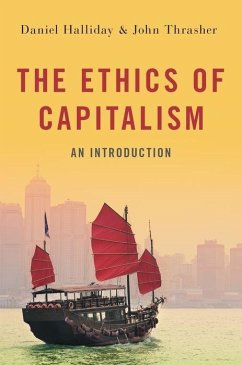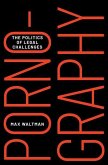Daniel Halliday (Senior Lecturer in Senior Lecturer in Philosophy, John Thrasher (Assistant Professor, Philosophy Department, Smith In
The Ethics of Capitalism
An Introduction
Daniel Halliday (Senior Lecturer in Senior Lecturer in Philosophy, John Thrasher (Assistant Professor, Philosophy Department, Smith In
The Ethics of Capitalism
An Introduction
- Broschiertes Buch
- Merkliste
- Auf die Merkliste
- Bewerten Bewerten
- Teilen
- Produkt teilen
- Produkterinnerung
- Produkterinnerung
This is an undergraduate-level textbook that introduces classical political philosophy as a framework to evaluate the ethics of capitalism up to the present day. It is rooted in historical eighteenth- and nineteenth-century defenses of capitalism, as written by key proponents such as Adam Smith and John Stuart Mill, and applies these arguments to contemporary issues such as wage inequality, global trade, climate change, and the welfare state. The authors aim to engage students in debating the ethics of economic systems-specifically capitalism, socialism, and feudalism-and whether various…mehr
Andere Kunden interessierten sich auch für
![Machinery of Government Machinery of Government]() Joseph Heath (Professor, Department of Philosophy, and Munk SchoolMachinery of Government41,99 €
Joseph Heath (Professor, Department of Philosophy, and Munk SchoolMachinery of Government41,99 €![Pornography Pornography]() Max Waltman (Assistant Professor, Assistant Professor, Stockholm UnPornography41,99 €
Max Waltman (Assistant Professor, Assistant Professor, Stockholm UnPornography41,99 €![The Birth of Ethics The Birth of Ethics]() Philip Pettit (Laurence Rockefeller University Professor of PoliticThe Birth of Ethics40,99 €
Philip Pettit (Laurence Rockefeller University Professor of PoliticThe Birth of Ethics40,99 €![The Communist Manifesto The Communist Manifesto]() Friedrich EngelsThe Communist Manifesto11,99 €
Friedrich EngelsThe Communist Manifesto11,99 €![What's the Point of Knowledge? What's the Point of Knowledge?]() Michael Hannon (Assistant Profes Assistant Professor of PhilosophyWhat's the Point of Knowledge?129,99 €
Michael Hannon (Assistant Profes Assistant Professor of PhilosophyWhat's the Point of Knowledge?129,99 €![Living Together Living Together]() David Schmidtz (Presidential C Presidential Chair of Moral ScienceLiving Together33,99 €
David Schmidtz (Presidential C Presidential Chair of Moral ScienceLiving Together33,99 €![The Oxford Handbook of Research Ethics The Oxford Handbook of Research Ethics]() The Oxford Handbook of Research Ethics242,99 €
The Oxford Handbook of Research Ethics242,99 €-
-
-
This is an undergraduate-level textbook that introduces classical political philosophy as a framework to evaluate the ethics of capitalism up to the present day. It is rooted in historical eighteenth- and nineteenth-century defenses of capitalism, as written by key proponents such as Adam Smith and John Stuart Mill, and applies these arguments to contemporary issues such as wage inequality, global trade, climate change, and the welfare state. The authors aim to engage students in debating the ethics of economic systems-specifically capitalism, socialism, and feudalism-and whether various contemporary economic injustices can be interpreted as legacy of each system. There are also study questions at the end of each chapter and an author-created companion website.
Hinweis: Dieser Artikel kann nur an eine deutsche Lieferadresse ausgeliefert werden.
Hinweis: Dieser Artikel kann nur an eine deutsche Lieferadresse ausgeliefert werden.
Produktdetails
- Produktdetails
- Verlag: Oxford University Press Inc
- Seitenzahl: 288
- Erscheinungstermin: 1. Juni 2020
- Englisch
- Abmessung: 233mm x 156mm x 20mm
- Gewicht: 452g
- ISBN-13: 9780190096212
- ISBN-10: 0190096217
- Artikelnr.: 58700044
- Herstellerkennzeichnung
- Libri GmbH
- Europaallee 1
- 36244 Bad Hersfeld
- 06621 890
- Verlag: Oxford University Press Inc
- Seitenzahl: 288
- Erscheinungstermin: 1. Juni 2020
- Englisch
- Abmessung: 233mm x 156mm x 20mm
- Gewicht: 452g
- ISBN-13: 9780190096212
- ISBN-10: 0190096217
- Artikelnr.: 58700044
- Herstellerkennzeichnung
- Libri GmbH
- Europaallee 1
- 36244 Bad Hersfeld
- 06621 890
Daniel Halliday is Senior Lecturer in Philosophy at the University of Melbourne. He earned his Ph.D. in Philosophy from Stanford University in 2011. John Thrasher is Assistant Professor in the Philosophy Department and in the Smith Institute for Political Economy and Philosophy at Chapman University in Orange County, California. He is also an Adjunct Senior Research Fellow at Monash University. He earned his Ph.D. in Philosophy from the University of Arizona in 2013.
* Contents
* Chapter 1: Introduction: What is this book about?
* 1. Everyone hates capitalism?
* 2. What is capitalism?
* 3. What are the alternatives to capitalism?
* 4. "Ethics of Capitalism": an oxymoron?
* Conclusions
* Study Questions
* Chapter 2: Capitalism seemed like a good idea at the time: The rise
and fall (and resurrection?) of Political Economy
* 1. 1770-1868: The "Golden Age" of Political Economy
* 2. The "Fragmented Age": Economics and Political Philosophy in the
20th Century
* 3. The Idea of Economic Justice
* Conclusions
* Study Questions
* Further Reading
* Chapter 3: Getting out of feudalism--and staying out!
* 1. Feudalism and Capitalism
* 2. Great Escapes: Australian convicts, American radicals, and other
heroes
* 3. Signs of a revival of feudalism?
* 4. Inherited wealth and the return of the 'rentier'
* 5. Big business and labor market domination
* Conclusions
* Study Questions
* Further Reading
* Chapter 4: Market Order and Market Failure
* 1. Spontaneous orders and why they matter
* 2. Prices and information
* 3. Can markets fail?
* 4. Markets behaving badly
* a. Price gouging
* b. Positional goods
* c. Public goods
* 5. Market failure or government failure?
* Conclusions
* Study Questions
* Further Reading
* Chapter 5: So, why not socialism?
* 1. The century of socialism
* 2. What is socialism?
* 3. Types of socialism
* a. "Utopian" socialism
* b. Anarchism
* c. Marxism
* 4. Market socialism
* 5. Problems with socialism
* 6. Ideals and reality
* 7. Ethical socialism
* Conclusions
* Study Questions
* Further Reading
* Chapter 6: Low wages and lousy jobs
* 1. The old stories: Malthus, Mill, and competitions among the
unskilled
* 2. What makes a lousy job lousy?
* 3. Is alienated labor under-rated?
* 4. Exploitation-not getting out what you put in
* 5. Exploitation-alternatives to Marx
* 6. The new story: runaway incomes at the top
* Conclusions
* Study Questions
* Further Reading
* Chapter 7: The welfare state and its rivals
* 1. Labor markets and the minimum wage
* 2. The classic welfare state
* 3. Subsidized idleness or empowerment for the masses? The case for
Universal Basic Income
* 4. Prevention is better than cure? Property owning democracy
* 5. Meritocracy
* 6. Comparing Systems
* Conclusions
* Study Questions
* Further Reading
* Chapter 8: We are the world, or how I learned to stop worrying and
love global trade
* 1. Globalization-the new common enemy?
* 2. Homo Mercator
* 3. Why do we trade, anyway?
* 4. The British Empire and the persistence of pseudo-trade
* 5. The old skepticism: mercantilism and why the British Empire was
actually bad for the British
* 6. The new skepticism: populism in the 21st century
* 7. Trade injustice in the 21st century
* 8. If trade isn't the enemy, then what (or who) is?
* a. Protectionism and subsidizing failing industries
* b. Mobility of capital and its impact on taxation
* c. Automation
* Conclusions
* Study Questions
* Further Reading
* Chapter 9: Keeping up with the Jones's (and the Kardashians):
Positional goods and wars of all against all
* 1. We can't all be better than average
* 2. Zero-sum versus positive-sum
* 3. Capitalism's greatest disappointment?
* 4. Arms races, good and bad
* 5. Peace treaties and finish lines
* Conclusions
* Study Questions
* Further Reading
* Chapter 10: Why are we still working so hard?
* 1. Keynes and the 15-hour week
* 2. What jobs are machines "stealing", and how?
* 3. More on machine misbehavior
* 4. The (moral) importance of leisure time
* 5. The end of work?
* Conclusions
* Study Questions
* Further Reading
* Chapter 11: Do markets wreck the planet?
* 1. Stories of destruction
* a. Markets aren't the only culprits
* b. Resources often get consumed more readily than conserved
* c. Resources aren't intrinsically limited
* 2. Why is the environment so vulnerable? Collective action problems
and the distribution of incentives
* a. Prevention
* b. Alleviation
* 3. If it ain't broke don't sell it? Planned obsolescence
* 4. Who wants to shoot a rhino? Markets and conservation
* Conclusions
* Study Questions
* Further Reading
* Chapter 12: Boldly going where no market has gone before--should some
things not be for sale?
* 1. Kidneys, used underwear, and tossed dwarfs: intuitive discomfort
about commodification
* 2. The moral downsides of prohibition
* 3. Are some things "beyond price"?
* 4. Markets as hierarchy-reinforcers
* 5. Maybe it's all just too much? Privacy and the need for (any kind
of) market-free zone
* Conclusions
* Study Questions
* Further reading
* References
* Chapter 1: Introduction: What is this book about?
* 1. Everyone hates capitalism?
* 2. What is capitalism?
* 3. What are the alternatives to capitalism?
* 4. "Ethics of Capitalism": an oxymoron?
* Conclusions
* Study Questions
* Chapter 2: Capitalism seemed like a good idea at the time: The rise
and fall (and resurrection?) of Political Economy
* 1. 1770-1868: The "Golden Age" of Political Economy
* 2. The "Fragmented Age": Economics and Political Philosophy in the
20th Century
* 3. The Idea of Economic Justice
* Conclusions
* Study Questions
* Further Reading
* Chapter 3: Getting out of feudalism--and staying out!
* 1. Feudalism and Capitalism
* 2. Great Escapes: Australian convicts, American radicals, and other
heroes
* 3. Signs of a revival of feudalism?
* 4. Inherited wealth and the return of the 'rentier'
* 5. Big business and labor market domination
* Conclusions
* Study Questions
* Further Reading
* Chapter 4: Market Order and Market Failure
* 1. Spontaneous orders and why they matter
* 2. Prices and information
* 3. Can markets fail?
* 4. Markets behaving badly
* a. Price gouging
* b. Positional goods
* c. Public goods
* 5. Market failure or government failure?
* Conclusions
* Study Questions
* Further Reading
* Chapter 5: So, why not socialism?
* 1. The century of socialism
* 2. What is socialism?
* 3. Types of socialism
* a. "Utopian" socialism
* b. Anarchism
* c. Marxism
* 4. Market socialism
* 5. Problems with socialism
* 6. Ideals and reality
* 7. Ethical socialism
* Conclusions
* Study Questions
* Further Reading
* Chapter 6: Low wages and lousy jobs
* 1. The old stories: Malthus, Mill, and competitions among the
unskilled
* 2. What makes a lousy job lousy?
* 3. Is alienated labor under-rated?
* 4. Exploitation-not getting out what you put in
* 5. Exploitation-alternatives to Marx
* 6. The new story: runaway incomes at the top
* Conclusions
* Study Questions
* Further Reading
* Chapter 7: The welfare state and its rivals
* 1. Labor markets and the minimum wage
* 2. The classic welfare state
* 3. Subsidized idleness or empowerment for the masses? The case for
Universal Basic Income
* 4. Prevention is better than cure? Property owning democracy
* 5. Meritocracy
* 6. Comparing Systems
* Conclusions
* Study Questions
* Further Reading
* Chapter 8: We are the world, or how I learned to stop worrying and
love global trade
* 1. Globalization-the new common enemy?
* 2. Homo Mercator
* 3. Why do we trade, anyway?
* 4. The British Empire and the persistence of pseudo-trade
* 5. The old skepticism: mercantilism and why the British Empire was
actually bad for the British
* 6. The new skepticism: populism in the 21st century
* 7. Trade injustice in the 21st century
* 8. If trade isn't the enemy, then what (or who) is?
* a. Protectionism and subsidizing failing industries
* b. Mobility of capital and its impact on taxation
* c. Automation
* Conclusions
* Study Questions
* Further Reading
* Chapter 9: Keeping up with the Jones's (and the Kardashians):
Positional goods and wars of all against all
* 1. We can't all be better than average
* 2. Zero-sum versus positive-sum
* 3. Capitalism's greatest disappointment?
* 4. Arms races, good and bad
* 5. Peace treaties and finish lines
* Conclusions
* Study Questions
* Further Reading
* Chapter 10: Why are we still working so hard?
* 1. Keynes and the 15-hour week
* 2. What jobs are machines "stealing", and how?
* 3. More on machine misbehavior
* 4. The (moral) importance of leisure time
* 5. The end of work?
* Conclusions
* Study Questions
* Further Reading
* Chapter 11: Do markets wreck the planet?
* 1. Stories of destruction
* a. Markets aren't the only culprits
* b. Resources often get consumed more readily than conserved
* c. Resources aren't intrinsically limited
* 2. Why is the environment so vulnerable? Collective action problems
and the distribution of incentives
* a. Prevention
* b. Alleviation
* 3. If it ain't broke don't sell it? Planned obsolescence
* 4. Who wants to shoot a rhino? Markets and conservation
* Conclusions
* Study Questions
* Further Reading
* Chapter 12: Boldly going where no market has gone before--should some
things not be for sale?
* 1. Kidneys, used underwear, and tossed dwarfs: intuitive discomfort
about commodification
* 2. The moral downsides of prohibition
* 3. Are some things "beyond price"?
* 4. Markets as hierarchy-reinforcers
* 5. Maybe it's all just too much? Privacy and the need for (any kind
of) market-free zone
* Conclusions
* Study Questions
* Further reading
* References
* Contents
* Chapter 1: Introduction: What is this book about?
* 1. Everyone hates capitalism?
* 2. What is capitalism?
* 3. What are the alternatives to capitalism?
* 4. "Ethics of Capitalism": an oxymoron?
* Conclusions
* Study Questions
* Chapter 2: Capitalism seemed like a good idea at the time: The rise
and fall (and resurrection?) of Political Economy
* 1. 1770-1868: The "Golden Age" of Political Economy
* 2. The "Fragmented Age": Economics and Political Philosophy in the
20th Century
* 3. The Idea of Economic Justice
* Conclusions
* Study Questions
* Further Reading
* Chapter 3: Getting out of feudalism--and staying out!
* 1. Feudalism and Capitalism
* 2. Great Escapes: Australian convicts, American radicals, and other
heroes
* 3. Signs of a revival of feudalism?
* 4. Inherited wealth and the return of the 'rentier'
* 5. Big business and labor market domination
* Conclusions
* Study Questions
* Further Reading
* Chapter 4: Market Order and Market Failure
* 1. Spontaneous orders and why they matter
* 2. Prices and information
* 3. Can markets fail?
* 4. Markets behaving badly
* a. Price gouging
* b. Positional goods
* c. Public goods
* 5. Market failure or government failure?
* Conclusions
* Study Questions
* Further Reading
* Chapter 5: So, why not socialism?
* 1. The century of socialism
* 2. What is socialism?
* 3. Types of socialism
* a. "Utopian" socialism
* b. Anarchism
* c. Marxism
* 4. Market socialism
* 5. Problems with socialism
* 6. Ideals and reality
* 7. Ethical socialism
* Conclusions
* Study Questions
* Further Reading
* Chapter 6: Low wages and lousy jobs
* 1. The old stories: Malthus, Mill, and competitions among the
unskilled
* 2. What makes a lousy job lousy?
* 3. Is alienated labor under-rated?
* 4. Exploitation-not getting out what you put in
* 5. Exploitation-alternatives to Marx
* 6. The new story: runaway incomes at the top
* Conclusions
* Study Questions
* Further Reading
* Chapter 7: The welfare state and its rivals
* 1. Labor markets and the minimum wage
* 2. The classic welfare state
* 3. Subsidized idleness or empowerment for the masses? The case for
Universal Basic Income
* 4. Prevention is better than cure? Property owning democracy
* 5. Meritocracy
* 6. Comparing Systems
* Conclusions
* Study Questions
* Further Reading
* Chapter 8: We are the world, or how I learned to stop worrying and
love global trade
* 1. Globalization-the new common enemy?
* 2. Homo Mercator
* 3. Why do we trade, anyway?
* 4. The British Empire and the persistence of pseudo-trade
* 5. The old skepticism: mercantilism and why the British Empire was
actually bad for the British
* 6. The new skepticism: populism in the 21st century
* 7. Trade injustice in the 21st century
* 8. If trade isn't the enemy, then what (or who) is?
* a. Protectionism and subsidizing failing industries
* b. Mobility of capital and its impact on taxation
* c. Automation
* Conclusions
* Study Questions
* Further Reading
* Chapter 9: Keeping up with the Jones's (and the Kardashians):
Positional goods and wars of all against all
* 1. We can't all be better than average
* 2. Zero-sum versus positive-sum
* 3. Capitalism's greatest disappointment?
* 4. Arms races, good and bad
* 5. Peace treaties and finish lines
* Conclusions
* Study Questions
* Further Reading
* Chapter 10: Why are we still working so hard?
* 1. Keynes and the 15-hour week
* 2. What jobs are machines "stealing", and how?
* 3. More on machine misbehavior
* 4. The (moral) importance of leisure time
* 5. The end of work?
* Conclusions
* Study Questions
* Further Reading
* Chapter 11: Do markets wreck the planet?
* 1. Stories of destruction
* a. Markets aren't the only culprits
* b. Resources often get consumed more readily than conserved
* c. Resources aren't intrinsically limited
* 2. Why is the environment so vulnerable? Collective action problems
and the distribution of incentives
* a. Prevention
* b. Alleviation
* 3. If it ain't broke don't sell it? Planned obsolescence
* 4. Who wants to shoot a rhino? Markets and conservation
* Conclusions
* Study Questions
* Further Reading
* Chapter 12: Boldly going where no market has gone before--should some
things not be for sale?
* 1. Kidneys, used underwear, and tossed dwarfs: intuitive discomfort
about commodification
* 2. The moral downsides of prohibition
* 3. Are some things "beyond price"?
* 4. Markets as hierarchy-reinforcers
* 5. Maybe it's all just too much? Privacy and the need for (any kind
of) market-free zone
* Conclusions
* Study Questions
* Further reading
* References
* Chapter 1: Introduction: What is this book about?
* 1. Everyone hates capitalism?
* 2. What is capitalism?
* 3. What are the alternatives to capitalism?
* 4. "Ethics of Capitalism": an oxymoron?
* Conclusions
* Study Questions
* Chapter 2: Capitalism seemed like a good idea at the time: The rise
and fall (and resurrection?) of Political Economy
* 1. 1770-1868: The "Golden Age" of Political Economy
* 2. The "Fragmented Age": Economics and Political Philosophy in the
20th Century
* 3. The Idea of Economic Justice
* Conclusions
* Study Questions
* Further Reading
* Chapter 3: Getting out of feudalism--and staying out!
* 1. Feudalism and Capitalism
* 2. Great Escapes: Australian convicts, American radicals, and other
heroes
* 3. Signs of a revival of feudalism?
* 4. Inherited wealth and the return of the 'rentier'
* 5. Big business and labor market domination
* Conclusions
* Study Questions
* Further Reading
* Chapter 4: Market Order and Market Failure
* 1. Spontaneous orders and why they matter
* 2. Prices and information
* 3. Can markets fail?
* 4. Markets behaving badly
* a. Price gouging
* b. Positional goods
* c. Public goods
* 5. Market failure or government failure?
* Conclusions
* Study Questions
* Further Reading
* Chapter 5: So, why not socialism?
* 1. The century of socialism
* 2. What is socialism?
* 3. Types of socialism
* a. "Utopian" socialism
* b. Anarchism
* c. Marxism
* 4. Market socialism
* 5. Problems with socialism
* 6. Ideals and reality
* 7. Ethical socialism
* Conclusions
* Study Questions
* Further Reading
* Chapter 6: Low wages and lousy jobs
* 1. The old stories: Malthus, Mill, and competitions among the
unskilled
* 2. What makes a lousy job lousy?
* 3. Is alienated labor under-rated?
* 4. Exploitation-not getting out what you put in
* 5. Exploitation-alternatives to Marx
* 6. The new story: runaway incomes at the top
* Conclusions
* Study Questions
* Further Reading
* Chapter 7: The welfare state and its rivals
* 1. Labor markets and the minimum wage
* 2. The classic welfare state
* 3. Subsidized idleness or empowerment for the masses? The case for
Universal Basic Income
* 4. Prevention is better than cure? Property owning democracy
* 5. Meritocracy
* 6. Comparing Systems
* Conclusions
* Study Questions
* Further Reading
* Chapter 8: We are the world, or how I learned to stop worrying and
love global trade
* 1. Globalization-the new common enemy?
* 2. Homo Mercator
* 3. Why do we trade, anyway?
* 4. The British Empire and the persistence of pseudo-trade
* 5. The old skepticism: mercantilism and why the British Empire was
actually bad for the British
* 6. The new skepticism: populism in the 21st century
* 7. Trade injustice in the 21st century
* 8. If trade isn't the enemy, then what (or who) is?
* a. Protectionism and subsidizing failing industries
* b. Mobility of capital and its impact on taxation
* c. Automation
* Conclusions
* Study Questions
* Further Reading
* Chapter 9: Keeping up with the Jones's (and the Kardashians):
Positional goods and wars of all against all
* 1. We can't all be better than average
* 2. Zero-sum versus positive-sum
* 3. Capitalism's greatest disappointment?
* 4. Arms races, good and bad
* 5. Peace treaties and finish lines
* Conclusions
* Study Questions
* Further Reading
* Chapter 10: Why are we still working so hard?
* 1. Keynes and the 15-hour week
* 2. What jobs are machines "stealing", and how?
* 3. More on machine misbehavior
* 4. The (moral) importance of leisure time
* 5. The end of work?
* Conclusions
* Study Questions
* Further Reading
* Chapter 11: Do markets wreck the planet?
* 1. Stories of destruction
* a. Markets aren't the only culprits
* b. Resources often get consumed more readily than conserved
* c. Resources aren't intrinsically limited
* 2. Why is the environment so vulnerable? Collective action problems
and the distribution of incentives
* a. Prevention
* b. Alleviation
* 3. If it ain't broke don't sell it? Planned obsolescence
* 4. Who wants to shoot a rhino? Markets and conservation
* Conclusions
* Study Questions
* Further Reading
* Chapter 12: Boldly going where no market has gone before--should some
things not be for sale?
* 1. Kidneys, used underwear, and tossed dwarfs: intuitive discomfort
about commodification
* 2. The moral downsides of prohibition
* 3. Are some things "beyond price"?
* 4. Markets as hierarchy-reinforcers
* 5. Maybe it's all just too much? Privacy and the need for (any kind
of) market-free zone
* Conclusions
* Study Questions
* Further reading
* References








